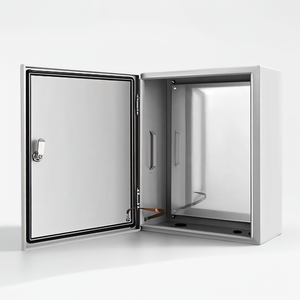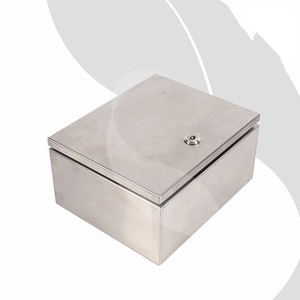
All categories
Featured selections
Trade Assurance
Buyer Central
Help Center
Get the app
Become a supplier

(147093 products available)




















Electrical control panels are essential for the smooth and safe functioning of electrical systems. They offer countless benefits by controlling and regulating various operations. The types include:
This type allows operators to manage processes using physical controls. The controls can be knobs, levers, or switches that users actively manipulate. Manual control panels are mostly used in simple applications where hands-on control is necessary. The provided human interaction gives flexibility in adjusting systems per immediate needs or observations. Also, they are often used in industries where critical processes require constant supervision.
Unlike manual control panels, automatic control panels manage processes without constant human intervention. They utilize sensors and controllers to monitor system parameters. These parameters include pressure, temperature, and humidity, adjusting outputs based on pre-set conditions. Automatic control panels are widely used in processes that require consistent performance. The processes include HVAC systems, manufacturing processes, and power generation. Moreover, automatic panels increase efficiency and reduce the potential for human error.
These panels are a subset of automatic panels but allow for more complex controllability. Programmable logic controllers (PLCs) enable users to set specific control sequences through programming. This offers flexibility for changing operational needs without hardware modifications. Thus, these panels are commonly used in industries where processes frequently change. The changes can be due to production variations or operational demand fluctuations.
These are vital for electrical distribution and management. They control the power flow and incorporate circuit breakers, fuses, and switches. Hence, they help safeguard electrical systems from overloading and short circuits. These panels also assist in the distribution of electricity to different areas within a facility. They are crucial in large industrial plants and commercial buildings with complex electrical systems.
These types are meant to manage the distribution of electrical power across various systems. They receive the input from power control panels and help disperse it to ensure all systems have the necessary energy. These panels also help monitor and manage energy consumption. Thus, they play a significant role in reducing inefficiencies and preventing system overloads. Businesses with high electrical demands benefit the most from these panels.
Electrical control panels are mainly used in industrial contexts to handle and regulate processes and systems. Their significance in industry lies in how they enhance operational efficiency while improving safety measures. Common industrial applications include:
Production processes depend more on electrical control panels. The panels control and regulate machinery, conveyor systems, and robotic arms. For instance, basic electrical systems for controlling motors and drives used in product assembly involve manual work. The reliable management of these systems results in enhanced manufacturing efficiency and consistency.
Energy management systems significantly impact all industrial entities. Businesses with huge energy consumption use electrical control panels to monitor and optimize energy usage. These panels help control the power distribution, minimize wastage, and even ensure that all systems receive the required voltage levels. Hence, this leads to reduced operational costs and improved sustainability.
Commercial enterprises often use these systems for heating, ventilation, and air conditioning. Electrical control panels manage these HVAC systems. They regulate temperature, monitor system performance, and ensure efficient energy use. Moreover, they allow for automated control of air circulation and temperature, giving the system the ability to adapt to changing environmental conditions.
Automotive manufacturing heavily relies on these control panels to manage assembly line automation. These panels control robotics in assembling parts and even quality assurance checks. Therefore, having precise control leads to reduced errors in production and ensures that vehicles undergo the required quality checks before being approved.
In the oil and gas sector, electrical control panels bring safety and operational effectiveness. They control pumps, valves, and other critical machinery in the exploration and production processes. For example, the panels ensure the proper functioning of control systems for drilling operations. This limits the possibility of manual error and minimizes the risks that come with it in such dangerous environments.
These control panels are one of the most efficient ways an electrical system can manage its operation. The panels' automatic and programmable features enhance efficiency, safety, and reliability. Common benefits include:
Due to automation, these panels always eliminate manual control, leading to operational efficiency. The automation allows systems to function seamlessly, reducing the time taken for tasks. This is particularly beneficial in mass production environments, where speed and efficiency are paramount. Moreover, with reduced operational times, businesses can increase production rates, directly impacting profitability.
Safety is one of the most vital factors in any industry, and electrical control panels handle hazardous processes more safely. They minimize the need for manual intervention in dangerous environments. These environments could be industrial machinery, chemical processing, or oil and gas exploration. Moreover, by continuously monitoring critical system parameters, control panels can detect abnormalities and send an alert before they become a problem. This decreases the risks of accidents and injuries in the workplace.
Automatic control panels lead to reduced labor costs since there is less manual work that needs to be done. Moreover, by optimizing energy usage and reducing wastage, these panels contribute to lower utility bills as well. Maintenance costs can be quite lower because modern control panels come with diagnostics and predictive maintenance tools.
Electrical control panels are highly customizable. These panels can be programmed to suit specific industrial requirements and then easily modified to accommodate changes. This flexibility is particularly useful in industries with fluctuating demands or seasonal variations. With the growing needs of a business, the control panels can be easily reprogrammed without replacing hardware.
We live in a digital age, and most systems now have a way of connecting remotely. Many of these control panels come equipped with the ability to allow users to operate and monitor them from a distance. This feature is particularly useful in such industries as power generation. Here, control panels are often located in remote areas. Remote monitoring makes it possible for operators to make real-time adjustments, ensuring optimal performance without being physically present at the location.
Choosing a control panel is based on its efficiency, safety, and longevity. When selecting electrical control panels for clients, there are several key factors to keep in mind. They include:
The type of industry will determine the kind of control panel that is needed most. If the industry requires manual control, go for a manual control panel, while those that need automation can use programmable ones. Also, consider the operational aspects of the industries. The electrical control panels should be compatible with the clients' existing infrastructure.
Various specifications, such as the power rating, number of circuits, and load capacity, will be considered. Ensure the control panel can handle the electrical load of the client's operations. Other important factors to consider here are the size and layout of the control panels. Clients with limited space can opt for compact panels. At the same time, those with large spaces can have extensive panels with more functionalities.
Electrical control panels must meet industry-specific standards and regulations. These regulations can be safety, environmental, or operational efficiency-related. For instance, these panels used in the oil and gas industry must adhere to stringent safety protocols. These standards differ from those in manufacturing or the automotive industry. So, while selecting, ensure they comply with local and international standards relevant to the client's industry.
It is only wise to consider the clients' future needs. After all, a growing business needs scalable electrical control panels. Can the control panels be modified to accommodate more circuits or faster processing in the future? Also, consider the advancements in technology. The electrical control panels should be updated with the latest tech to ensure increased efficiency.
Going over budget is the last thing any client wants. With various electrical control panels available, it shouldn't be too hard to find a suitable one within budget. Consider the overall cost, including installation, maintenance, and potential future upgrades. Sometimes, a more expensive panel with lower maintenance costs can be more profitable than cheaper, less durable ones.
These two panels cannot be compared because they operate differently. Manual control panels require employees to operate them by hand. On the other hand, automatic electrical control panels do all the work by themselves. Although they have different operational capabilities, the two types are compatible depending on the given situation. They both have the same ultimate goal, which is to improve a company's efficiency.
Common components include:
These work as the brains of the panel by controlling tasks and processes.
These two are protective devices that prevent electrical overloads and short-circuits by interrupting the circuit.
These are used to sense variables like temperature, pressure, or flow and provide feedback to the control system.
Once the users program the PLCs, they help in automating control processes.
Switches and push buttons let operators control and configure the panel and provide quick access.
Regular inspections to identify damaged components before the damage worsens will ensure the panels last longer. Also, frequent cleaning to remove dust and other debris go a long way in improving the panels' efficiency. Routine testing helps check for abnormalities in performance and fix them early. Finally, ensure detailed records of all maintenance activities are kept for easy reference in case of a problem.
Yes, electrical control panels are specially designed to withstand all the hazardous environments. These work hard to ensure safety and have features that increase it. These features include explosion-proof enclosures and intrinsic safety technology. These features also make them comply with safety regulations and standards.